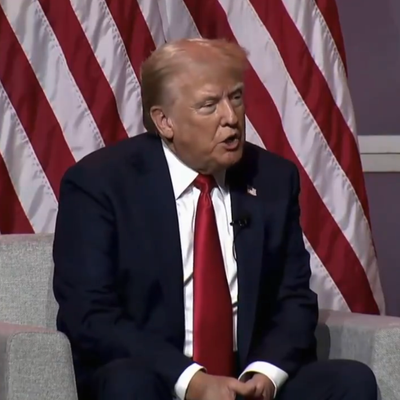

Hours after questioning Kamala Harris’s Blackness during a tense panel interview at a National Association of Black Journalists conference, Donald Trump did what he usually does after stirring up outrage: He stirred up some more.
Shortly after his appearance, Trump posted to Truth Social a 2019 clip of Harris cooking with Mindy Kaling, which emphasized Harris’s Indian heritage.
At a rally in Harrisburg, Pennsylvania, on Wednesday night, it was clear that Trump’s campaign was leaning into the incendiary (and obviously false) message that Harris had once represented herself only as Indian:
And on Thursday, Trump went even further, in typically unsettling fashion.
Trump’s embattled running mate, J.D. Vance, joined in on the new line of attack Wednesday night, at least to an extent. Vance said, “Earlier this week, look up the clip, she went down to Georgia and started talking with a fake southern accent. What the hell is that all about? Kamala Harris grew up in Canada. They don’t talk like that in Vancouver or Quebec or wherever she came from, doesn’t matter.”
As Vance surely knows, Harris grew up partially in Montreal, not Vancouver. His accent criticism was referring to a recent speech Harris gave in Atlanta, in which she seemed to adopt a southern twang. Tailoring one’s speech patterns depending on the audience is hardly new terrain for politicians, but Vance’s attack was notable coming from someone whose evolving views on Trump — from “Hitler” to demigod — have made him a poster boy for political chameleons.
Responding to Trump’s provocations on Wednesday night during an address to the Sigma Gamma Rho Sorority, Inc., in Houston, Harris said Trump had displayed “the same old show of divisiveness and disrespect” and that “the American people deserve better.”
This ugly chapter in the presidential campaign began on Wednesday afternoon, when Trump took questions from three journalists at a conference for the National Association of Black Journalists.
The National Association of Black Journalists’ decision to invite Donald Trump to speak at its conference in Chicago divided the organization. Many members pointed out that Trump had a long history of racist comments and actions and that he frequently insulted Black journalists, especially Black women, during his presidency. (The Washington Post’s Karen Attiah, a co-chair of the conference, stepped down in protest.) Others argued that the organization should not pass on the opportunity to grill the man who may become president again in a few months.
In the end, Trump did demean and try to bully his way through his panel interview, conducted by ABC News’ Rachel Scott, Semafor’s Kadia Goba, and Fox News’ Harris Faulkner. But Trump also offered a reminder that when he is exposed to mainstream-news reporters’ questions, he has a tendency to self-destruct and reveal his unfiltered self.
Trump was belligerent from the start. He attacked Scott after she cited the controversy over his appearance, asking him why voters should trust him given his history of birtherism, degrading remarks, and other offenses.
His comments drew gasps from the audience, as they did throughout the interview. (And there was laughter when Trump claimed that he had “been the best president for the Black population since President Lincoln.”)
Trump complained about audio issues and grumbled that Kamala Harris hadn’t shown up at the event and was instead conducting her own interview via Zoom.
But the real fireworks came soon after when Scott asked Trump about Republican attacks against Harris for being a “DEI hire.” Trump first asked Scott to define the term DEI, and when her answer didn’t satisfy him, he pressed her again. He then told Scott that he had long known Harris “indirectly” and claimed, bizarrely, that she had only recently started identifying as Black.
Scott told Trump that Harris always identified as a Black woman and had attended a historically Black college.
There was more. He kept on attacking Scott for her opening remarks about his record. He told the room that undocumented immigrants are coming for “Black jobs,” repeating a line he used during his debate with President Biden.
In less inflammatory comments, Trump appeared to downplay the importance of his running mate, who has drawn wide criticism since Trump selected him two weeks ago.
He also said he would pardon January 6 rioters who assaulted police officers.
The interview came to an abrupt end after about 34 minutes.
In a statement, the Harris Campaign said that “Trump lobbed personal attacks and insults at Black journalists the same way he did throughout his presidency — while he failed Black families and left the entire country digging out of the ditch he left us in.”
But journalists grilling Trump received strong reviews, validating the NABJ’s decision to invite him — chaos or not.




